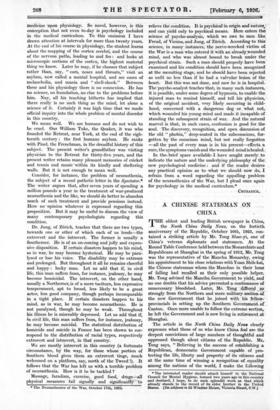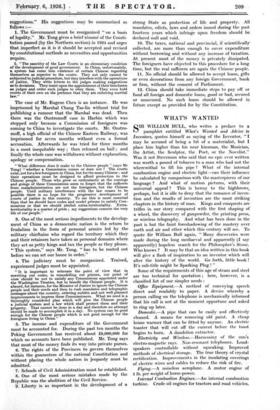X _CHINESE STATESMAN ..ON CHINA
THE oldest and leading British newspaper in China, the North. China Daily News, on the fortieth, anniversary of the Republic, October 10th, 1925, con- tained a striking article by Mr. Tong Shao-yi, one of China's veteran diplomats and statesmen. At the Round Table Conference held between the Monarchists and Republicans at Shanghai in the spring of 1912, Mr. Tong was the representative of the Manchu Monarchy, owing his appointment to his close relations with Yuan Shih-kai, the Chinese statesman whom the Manchus in their hour of falling had recalled as their only possible helper. Mr. Tong advised the Manchu. Government to yield;_ and no one doubts that his advice prevented a continuance of unnecessary bloodshed. Later, Mr. Tong differed so strongly from the Northern and more military. seetion;g;f the new Government that he joined with his fellow: provincials in setting up the Southern Government of Canton. Once more unable to follow the extreme section, he left the Government and is now living in retirement at Shanghai.
The article in the North China Daily NMI clearly expresses what those of us who know China feel are the deepest convictions of large numbers of thoughtful and oppressed though silent citizens of the Republic. Mr. Tong says, " Believing in the success of establishing a Republican, democratic Government capable of pro- tecting the life, liberty and property of its citizens and at the same' time of winning a recognition' of equality among the nations of the world, I make the following * The interested reader should attach himself to the National Council for Mental Hygiene, formed two years ago in this country and destined, I hope, to do such splendid work 'as that which already stands to the record of its eider brother in the United States. (Its address is 55 Windsor House, Victoria Street, 9.w.) suggestions." His suggestions may be summarized as follows 1. The Government must be reorganized ," on a basis of legality." Mr. Tong gives a brief résumé of the Consti- tution passed (by the Northern section) in 1924 and urges that imperfect as it is it should be accepted and revised by constitutional methods as necessities and opportunities require.
2. "The sanctity of the Law. Courts is an elementary condition of the development of good government.' In China, unfortunately, i a system has come into existence of certain Chinese regarding themselves as superior to the courts. They not only cannot be subjected to judicial procedure, but they interfere with the operations of justice. They write letters to the judges making suggestions as to decisions. They insist upon the appointment of their henchmen as judges and order such judges to obey them. They even hold courts of their own on the pretence that they are enforcing martial law."
The case of Mr. Eugene Chen is an instance. He was imprisoned by Marshal Chang Tso-lin without trial for publishing a rumour that the Marshal was dead. Then there was the Oustromoff case in Harbin which was stopped only because a Commission of foreigners was coming to China to investigate the courts. Mr. Oustro- moff, a high official of the Chinese Eastern Railway, was imprisoned for seven months without even a formal accusation. Afterwards he was tried for three months in a most inequitable way ; then released on bail ; and finally the whole case was withdrawn without explanation, apology or compensation.
" What difference does it make to the Chinese people " (says Mr Tong) "whether a Commission comes or does not ? The courts exist, not fora few foreigners in China, but for the many Chinese ; and their operations must be designed to afford protection to the Chinese people. Those who grow so enthusiastic at the comings and goings of these Commissions seem to forget that the sufferers from maladministration are not the foreigners, but the Chinese people. Until military interference with the law ceases to be possible there is no hope for the progressive development of courts of justice in this country. To me this is more essential than that we should have codes and model prisons to satisfy Com- missions or that we shoidd abolish extraterritoriality. Extra- territoriality is a matter of pride ; my suggestions concern the very life of our people."
8. One of the most serious impediments to the develop- ment of China as a democratic nation is the return to feudalism in the form of personal armies led by the military chieftains who regard the territory which they and their retainers have taken as personal domains where they act as petty kings and tax the people as they please. " This system," says Mr. Tong, " has to be rooted out before we can set our house in order."
4. The judiciary must be reorganized. Trained, experienced judges must be appointed. , "It is important to reiterate the point of view that in rewriting our codes, in remodelling our prisons, our point of view should be not to satisfy any Commissions appointed under the Washington Treaties, but to benefit the Chinese people. It is absurd, for instance, for the Minister of Justice to ignore the Chinese people and their needs and then to rush mandates and telegraphic messages about the country, ordering sudden and not well-planned improvements to impress these Commissioners. What we need is a thoroughly considered plan which will give the Chinese people a judicial system and a law which shall protect them and their property. . That cannot .be done in a day and therefore no attempt should be made to accomplish it in a day. No system can be good enough for the Chinese people which is not good enough for the foreigners living in China."
. 6. The income and expenditure of the Government must be accounted for. During the past ten months the Peking Government has received about £9,000,000 for which no accounts have been published. Mr. Tong says that most of the money finds its way into private purses.
6. The rights of the Provinces to govern themselves within the guarantees of the national Constitution and without placing the whole nation in jeopardy must be admitted.
7. Schools of Civil Administration must be established.
8. One of the most serious mistakes made by the Republic was the abolition of the Civil Service. -9. Liberty is as important in the development of a
•
strong State as protection of life and property. All mandates, edicts, laws and orders issued during the past fourteen years which infringe upon freedom should be declared null and void.
10. The taxes, national and provincial, if scientifically collected, are more than enough to cover expenditure without borrowing and without any increase of taxation. At present most of the money is privately dissipated.
The foreigners have objected to this procedure for a long time, but the real sufferers are again the Chinese people.
11. No official should be allowed to accept loans, gifts or even decorations from _ any foreign Government, bank or firm, without the consent of Parliament.
12. China should take immediate steps to pay off or fund all foreign and domestic loans, good or bad, secured or unsecured. No such loans should be allowed in future except as provided for by the Constitution.



























































 Previous page
Previous page